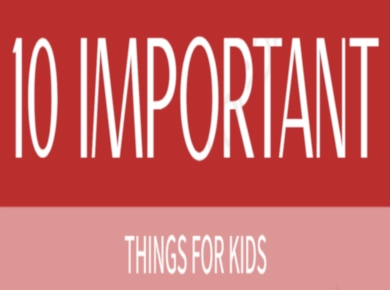10 Important Things for Kids
A Comprehensive Guide for Parents
[ez-toc]
As a parent, you want the best for your child. You want them to be healthy, happy, and successful in life. While there is no one-size-fits-all approach to raising a child, there are certain things that are universally important for kids. Here is a detailed look at the 10 most important things for kids, keeping in mind the search intent of parents:
-
Health and Well-being:
- Nutrition: Ensure your child eats a balanced diet that includes plenty of fruits, vegetables, whole grains, and lean protein. Limit processed foods, sugary drinks, and unhealthy fats.
- Physical Activity: Encourage your child to get at least 60 minutes of physical activity each day. This can include playing sports, riding a bike, or simply running around outside.
- Sleep: Children need 10-12 hours of sleep per night. Establish a regular bedtime routine and make sure your child’s bedroom is dark, quiet, and cool.
- Dental and Medical Care: Take your child for regular check-ups with the doctor and dentist. Vaccinate your child according to the recommended schedule.
-
Education:
- Early Childhood Education: Enroll your child in a high-quality preschool or daycare program. Early childhood education can help your child develop the skills they need to succeed in school and life.
- K-12 Education: Make sure your child attends a school that provides a well-rounded education, including core subjects, arts, and physical education.
- Parental Involvement: Be involved in your child’s education. Attend parent-teacher conferences, help with homework, and read to your child regularly.
-
Safety and Security:
- Home Safety: Make sure your home is safe for your child. This includes covering electrical outlets, securing furniture, and keeping dangerous objects out of reach.
- Stranger Danger: Teach your child about stranger danger and how to stay safe when they are away from home.
- Cyber Safety: Teach your child about internet safety and how to protect their personal information online.
- Emotional Safety: Create a safe and supportive home environment where your child feels loved and accepted.
-
Love and Nurturing:
- Unconditional Love: Let your child know that you love them unconditionally, no matter what.
- Positive Reinforcement: Praise your child for their accomplishments and good behavior. Avoid punishment whenever possible.
- Quality Time: Spend quality time with your child each day. This could include playing games, reading stories, or just talking.
-
Social and Emotional Development:
- Encourage Social Interactions: Encourage your child to interact with other children. This can help them develop social skills, empathy, and cooperation.
- Teach Emotional Regulation: Help your child learn to identify and manage their emotions. Teach them healthy coping mechanisms for dealing with stress and disappointment.
- Set Limits and Boundaries: Set clear limits and boundaries for your child. This helps them learn self-control and discipline.
-
Play and Recreation:
- Unstructured Play: Allow your child to have plenty of unstructured play time. This type of play helps them develop creativity, imagination, and problem-solving skills.
- Structured Activities: Enroll your child in structured activities such as sports, music, or art classes. These activities can help them develop new skills and interests.
-
Cultural Awareness and Appreciation:
- Expose Your Child to Different Cultures: Expose your child to different cultures through books, movies, music, and travel. This helps them develop an appreciation for diversity and learn about the world around them.
- Teach Your Child About Their Own Culture: Teach your child about their own culture and heritage. This helps them develop a sense of identity and pride.
-
Communication and Language Skills:
- Read to Your Child: Read to your child regularly. This helps them develop language skills, vocabulary, and a love of reading.
- Talk to Your Child: Talk to your child about your day, their day, and anything else that comes to mind. This helps them develop communication skills and learn new words.
- Encourage Your Child to Express Themselves: Encourage your child to express themselves through writing, drawing, or other creative outlets. This helps them develop their communication skills and self-expression.
-
Financial Literacy:
- Teach Your Child About Money: Teach your child about money management, budgeting, and saving. This helps them develop responsible financial habits that will benefit them throughout their lives.
- Give Your Child Opportunities to Earn and Save Money: Give your child opportunities to earn and save money. This could include doing chores around the house or getting a part-time job.
-
Ethics and Moral Values:
- Teach Your Child About Right and Wrong: Teach your child about right and wrong, and help them develop a strong moral compass.
- Set a Good Example: Be a good role model for your child. Your child will learn from watching you, so make sure you are demonstrating the values you want them to learn.
By focusing on these 10 important things, you can help your child grow up to be a healthy, happy, and successful individual.
